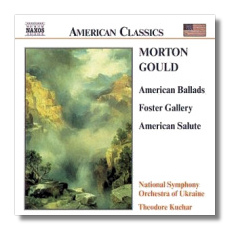
The Internet's Premier Classical Music Source
Related Links
- M. Gould Reviews
- Latest Reviews
- More Reviews
-
By Composer
-
Collections
DVD & Blu-ray
Books
Concert Reviews
Articles/Interviews
Software
Audio
Search Amazon
Recommended Links
Site News
 CD Review
CD Review
Morton Gould

Americana
- American Ballads
- Foster Gallery
- American Salute
National Symphony Orchestra of Ukraine/Theodor Kuchar
Naxos American Classics Series 8.559005 73:48
If you're not familiar with the works of Morton Gould, that won't stand in the way of the familiarity of mostly everything on this disc. Morton Gould (1913-96), with a background in classical music, jazz, and popular music in the various venues of vaudeville, radio, Broadway and the concert hall, was a conductor, arranger, and, of course, composer. He was a kind of Leonard Bernstein before Bernstein. Here, he is heard in music based on patriotic themes and on those of the tragic American composer Stephen Foster, whose penchant for alcohol curtailed his life as it did his near-contemporary in literature – and, in many ways, artistic soul mate – Edgar Allan Poe.
American Ballads is a work comprised of six sections, based on famous patriotic themes. The first, for example, uses the Francis Scott Key theme in the National Anthem. Actually, it wasn't Key who wrote the theme, but it's his treatment of it that the first section is based on. The ensuing movement is subtitled Amber Waves, and I needn't inform you of the source material comprising it. All six sections contain utterly familiar themes and Gould's handling of them is masterful and delightful. The angst you get with Mahler, you won't find here, but you will get color and unpretentious outpourings of, is it, patriotism? I think so. Certainly, you can't make a case that Gould is poking fun or seeing irony in this stuff. Actually, in Memorials, section four, the music does turn quite serious, and has a few angst-like moments.
Foster Gallery uses themes from some of Foster's most popular songs. The opening movement is entitled Camptown Races, and there are two further sections, called Camptown Variation. The fourth is entitled Swanee River, the sixth Old Black Joe and My Old Kentucky Home, the eighth Jeannie with the Light Brown Hair, and the thirteenth Oh, Susanna. You can't get more American in spirit than Gould becomes here. The music is effervescent and infectious throughout, colorfully orchestrated and absolutely brilliant.
The last work, American Salute, employs the theme from Johnnie Comes Marching Home. The treatment is not sentimental, but rather glorious, aiming toward a more patriotic sentiment. All in all, the music on this disc is attractive, if light, and a document of Gould's uncanny orchestrational ability and fine sense for color.
Isn't is an irony that the music is played – and well – by the National Symphony Orchestra of Ukraine, led by Ukrainian-born Theodor Kuchar? It should be mentioned, even if it dilutes the point of my last observation, that Kuchar was educated in this country and has been involved in Marco Polo's series on classic American film scores. In any event, this is a well-played and -interpreted disc, featuring fine sound and intelligent notes. Recommended.
Copyright © 2001, Robert Cummings




















